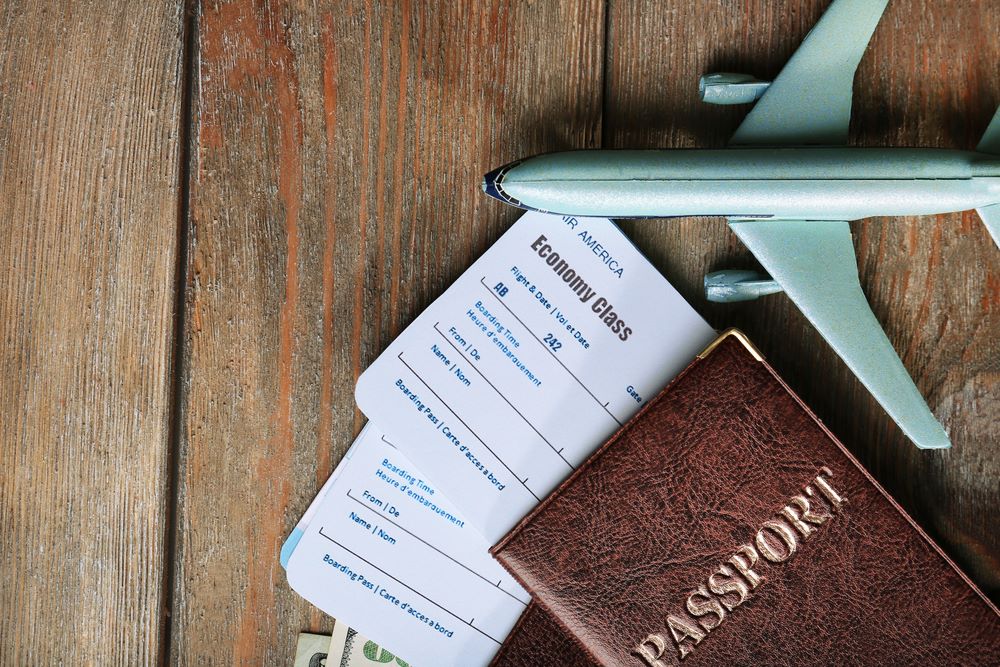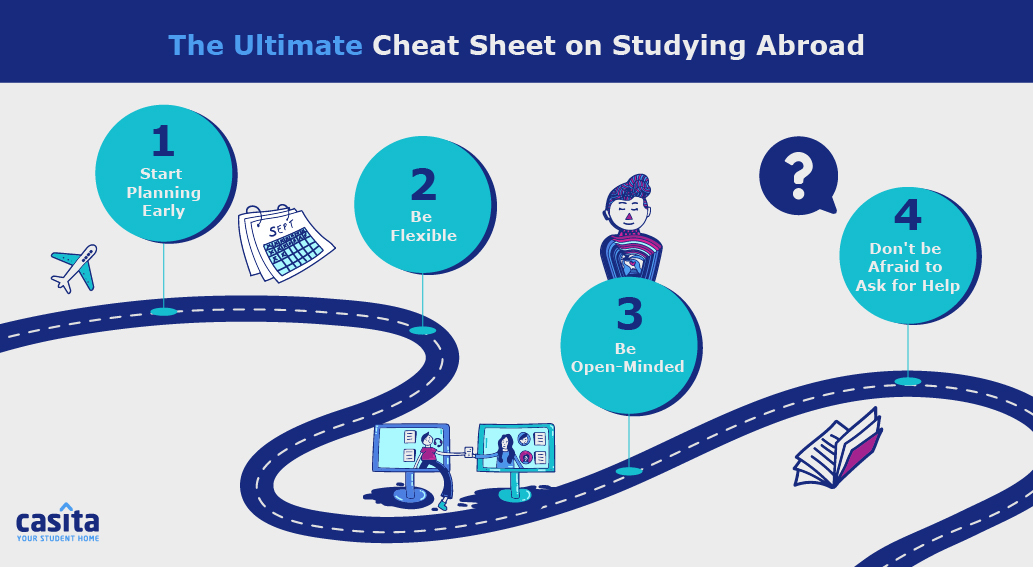The Ultimate Cheat Sheet on Studying Abroad
Tips and Advice
Travel Preparation
6 mins read
Share

Updated at: 16 December, 2024
Published at: 07 November, 2019
By Allaa Ashraf
The Ultimate Cheat Sheet on Studying Abroad
Tips and Advice
Travel Preparation
6 mins read

Updated at: 16 December, 2024
Published at: 07 November, 2019
By Allaa Ashraf
Share
Studying abroad is an exhilarating and life-changing experience that offers countless opportunities for personal, academic, and professional growth. Nothing beats this wonderful life experience of studying abroad on many levels! You grow to be adventurous, independent, and always curious to discover more of the world.
You get to truly experience the country's culture, language, and student life. Studying abroad is an amazing opportunity to improve your language skills and expand your horizons. But it can also be daunting, especially if you're unsure where to start.
That's where this cheat sheet comes in. We've compiled all the essential information you need to know about studying abroad, from choosing a programme to applying for visas.
So whether you're just starting to think about studying abroad or you're already in the planning stages, this cheat sheet will help you every step of the way! Let’s delve right into the details!

How Do I Study Abroad?
There are various factors you need to keep in mind upon deciding to study abroad. You have to research your choices thoroughly; choose a university, check the cost of living within a country, check airline tickets, decide on student housing, etc.
Here, we’re discussing the essence of everything you need to know to study abroad independently.
1. Decide Why You Want To Study Abroad
Before you start planning your study abroad adventure, it's important to figure out why you want to do it. Are you looking to improve your language skills? Experience a new culture? Expand your academic horizons? Once you know your motivation, you can start to narrow down your options.
2. Decide on a Destination and a University Major
When selecting the perfect study-abroad destination, it is crucial to consider several factors to make an informed decision. Start by researching various universities and their exchange programmes, consulting academic advisors, and seeking guidance from study abroad offices.
Factors to consider include academic programmes, cultural immersion, language proficiency, the cost of living, safety, and personal preferences. If you already have a country in mind, that's great, but if not, it can be helpful to choose a destination based on your major.
Conduct research on the best universities offering programmes in your field of interest. For example, consider universities in London, New York, Sydney, and Melbourne if you plan to study business and finance.
For English literature, explore institutions like Oxford, Dublin, and Edinburgh. Glasgow is known for its music programmes, while Singapore offers excellent options for education and engineering. Also, don’t forget to check out the university rankings!
Additionally, investigate if your university has partnerships and student exchange programmes with institutions abroad, as this can facilitate credit transfers and allow you to continue your studies seamlessly.
So, thoroughly research universities that align with your academic goals and interests. Pay attention to admission requirements, application deadlines, and necessary documentation. Gather all the required materials, including academic transcripts, recommendation letters, essays, and language proficiency test scores, and submit your application well in advance.

3. Research Cost of Living
It is no secret that travelling abroad is relatively expensive. Upon deciding on a university, you must research the average cost of living in the city. Transportation and living costs vary from one country to another, depending on your student housing and your daily eating habits; however, researching the basic costs can give you an idea of how much cash you might need when living and studying abroad.
The average international student in Australia spends approximately AUD$1,596.50 per month. While the average monthly spending of international students in the US and the UK is $714 and £972.63, respectively.
Additionally, it is strongly recommended to research all the possible discount options in a country before moving there. Most popular student cities offer discounts and have special prices for students, so it might be a good idea to keep your student ID and student discount card with you at all times to benefit from them, as they can get you into museums and other tourist attractions at a reduced price.

4. Finance Your Study Abroad Experience
Studying abroad can be expensive, but don't let finances deter you. Explore available scholarships, grants, and financial aid options specifically designed for international students. Consider part-time work opportunities, crowdfunding, and creating a detailed budget to manage your expenses effectively.
5. Apply for Visas and Financial Aid
When planning to study abroad, it is crucial to address both visa requirements and financial aid opportunities. Start by researching the visa requirements specific to the country you will be visiting and consulting the embassy or consulate of your destination country for detailed information. Begin the visa application process well in advance and ensure you gather all the necessary documents, including passport copies, financial statements, acceptance letters, and health insurance information.
By compiling these documents, you will have a smoother visa application process. In addition to visa requirements, explore available financial aid options for study-abroad students. Apply for scholarships and grants that can help alleviate the financial burden of studying abroad. Be proactive in seeking out these opportunities and adhere to application deadlines.
6. Find Student Accommodation and Living Arrangements
Choosing suitable student accommodation is essential for a comfortable stay abroad and requires thorough research and consideration. Start by exploring various housing options, such as university dormitories, shared apartments, homestays, or private rentals. Evaluate factors like cost, proximity to campus, amenities, and safety when making your decision.
If you prefer sharing your room, determine if you are comfortable sharing the bathroom, kitchen, or only the building facilities. If you opt for a private sleeping space, inquire about all-inclusive bills, internet availability, contents insurance, and the main communal areas of the building.
If expenses like bills are not included in your rent, discuss how to split these costs fairly with your roommates. Choosing student housing with all-inclusive bills can be advantageous, as it covers most of your living expenses. Additionally, connect with fellow students through social media or university forums to explore roommate options and seek advice from experienced students who have gone through a similar process.
7. Seek Health and Safety Precautions
Prioritise your health and safety while studying abroad. Obtain comprehensive health insurance coverage and research healthcare facilities in your destination country. Stay updated on any required vaccinations and consult with your doctor before departure. Familiarise yourself with local emergency numbers, safety guidelines, and common scams to ensure a secure experience.
8. Choose Your Airline Ticket
Have you ever heard about a budget airline? They are the perfect choice for students travelling on a budget. These airlines are usually budget-friendly, non-refundable and offer only the bare minimum for a flight.
They usually don’t provide in-flight meals or refreshments and may not offer numbered seat allocations. The budget airline available near you differs based on where you are and where you intend to go.

9. Arrive and Settle in
When you arrive in your host country, it's important to take some time to settle in. This means finding a place to live, getting familiar with the area, and meeting new people.
10. Start Your Academic and Social Integration
Embrace studying abroad's academic and social aspects. Attend orientation programmes and workshops organised by your university to familiarise yourself with the campus, academic systems, and support services available. Engage with local and international students, join clubs and organisations, and participate in cultural activities to foster meaningful connections and create lifelong memories.
11. Embrace Personal Growth
Studying abroad offers a unique opportunity for personal growth and self-discovery. Embrace the challenges, step out of your comfort zone, and be open to new experiences. Develop cross-cultural competence, adaptability, and resilience. Reflect on your journey, maintain a journal, and capture memories through photography or blogging.
Final Thoughts
Here are some additional tips for studying abroad:
Start planning early. The application process for study abroad programmes can be competitive, so it's important to start planning early.
Be flexible. Things don't always go according to plan when you're studying abroad, so be prepared to be flexible.
Be open-minded. Studying abroad is a great opportunity to learn about new cultures and meet new people. Be open-minded and willing to try new things.
Don't be afraid to ask for help. If you're struggling with anything, don't be afraid to ask for help from your programme coordinator, your host family, or your new friends.

Don't hesitate to go for studying abroad, as it is an amazing experience that can change your life and shape your future. By following this cheat sheet, which includes planning ahead, conducting thorough research, staying organised, and embracing diverse opportunities, you will be well-prepared to embark on your study-abroad journey. So, if you're thinking about studying abroad, embrace the adventure and bon voyage to your transformative experience!
Tips and Advice
Travel Preparation
By Allaa Ashraf
Share
Tips and Advice
Travel Preparation
Updated at:
Published at:
By Allaa Ashraf
Share









